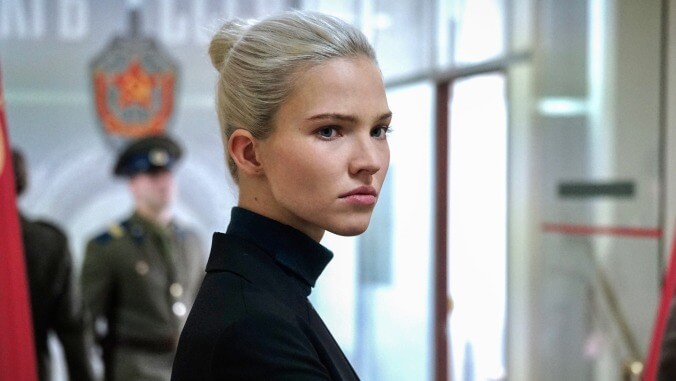Luc Besson has devoted his long career to showing the world that French movies can be even dumber than their Hollywood counterparts, and he offers plenty of proof in Anna, a parody of Cold War spy thrillers that gives the director no shortage of opportunities to once again leer at a statuesque woman with a gun. In this case, it’s Anna Poliatova (Sasha Luss), an elite KGB assassin who moonlights as a model—bleached blond, bisexual, handy with a silenced pistol, always dressed in short skirts and stockings with garters. Trained to kill by her handler-slash-lover Alex (Luke Evans) and her frosty superior Olga (Helen Mirren), Anna has come to Paris in the cold months of 1990, using fashion shoots for cover as she seduces and executes assorted businessmen. (Apparently the enemy of the USSR, which by this point would have been dissolving like Alka-Seltzer in a glass of water.) There’s a CIA agent named Miller (Cillian Murphy) on her trail, and eventually, she sleeps with him, too—though strictly in the interest of female empowerment, of course.
Think of it as a downmarket Atomic Blonde (a film that does Besson’s established shtick with a lot more panache and less ick) or Red Sparrow without the surface-level professionalism; what’s clear is that Besson doesn’t want anyone to think about Anna very hard. The action scenes (of which there are only a few) are derivative. The sex is awkwardly un-erotic. The twists are predictable, delivered through so many flashbacks and flash-forwards (“Five years later,” “three years earlier,” “six months later”) that the viewer eventually begins to feel like they’ve been conned into doing Besson’s math homework. The anachronisms (USB drives, clamshell cellphones, Windows laptops, etc.) are confounding; if there’s one thing Besson has succeeded at, it’s making a movie that’s set in the late ’80s and early ’90s look like it was produced around 2005. One has to presume that at least part of this has to be intentional. But unlike Besson’s bugnuts, energetically dopey Scarlett Johansson vehicle Lucy, Anna is more invested in winking at the audience than being fun. It only owns up to its trash potential in one sequence—a montage of fashion shoots, wig changes, and assassinations set to INXS’ “Need You Tonight.”
But considering that Besson’s work as both a director and a prolific writer-producer has tended to magnify the xenophobia, sexism, and doofy logic of his influences, one can never really be sure whether the parody is 100% conscious or not. The same could be said of the apparent self-portraiture. The formulaic plot could just as well be a depiction of Besson’s career-long m.o. of subjecting starlets (or, on very rare occasions, established stars like Johansson) to a gauntlet of fetishized genre conventions, which has come under more scrutiny in light of sexual abuse allegations leveled against the director in the aftermath of the Weinstein scandal. Presumably, that’s the reason why Anna has been dumped into theaters without fanfare or press screenings. Still, a critic can’t help but point out that Besson has always had what’s euphemistically called “a reputation,” and that the sexual politics of his films have always been neanderthalic—even in the context of such apparent flights of fancy as Valerian And The City Of A Thousand Planets. In fact, he’s basically made this movie before, with his 1990 thriller Nikita.
Maybe it’s no accident that Anna finds him returning to the year of that film’s breakout success, and perhaps to a time when reviewers who pointed out the creepiness of his femme-fatale fetish might still be dismissed as killjoys. Because the real fantasy at the center of Anna isn’t about glamour, guns, or even elaborate lingerie. It’s in the twists. One after another, our heroine sleeps with more powerful, conspicuously older men with whom she has zero screen chemistry because her career depends on it—a matter of life or death in a spy’s line of work. But then, with each clumsy revelation, we learn that, quelle surprise, it was Anna who was really in control the whole time. The men, they’re just pawns in her chess game. You see, it’s exactly what she wanted.












![HBO teases new Euphoria, Larry David, and much more in 2026 sizzle reel [Updated]](https://img.pastemagazine.com/wp-content/avuploads/2025/12/12100344/MixCollage-12-Dec-2025-09-56-AM-9137.jpg)




























